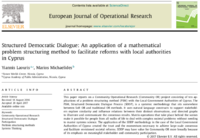Technology used for Peace in Cyprus: Difference between revisions
(→Abstract: added abstract) |
No edit summary |
||
| Line 2: | Line 2: | ||
|acronym=Structured Democratic Dialogue: An application of a mathematical problem structuring method to facilitate reforms with local authorities in Cyprus | |acronym=Structured Democratic Dialogue: An application of a mathematical problem structuring method to facilitate reforms with local authorities in Cyprus | ||
|logo=JOR_Paper_Laouris_CoverImage.png | |logo=JOR_Paper_Laouris_CoverImage.png | ||
|authors=[[Yiannis Laouris]] & [ | |authors=[[Yiannis Laouris]] & [George Tziapouras] | ||
|journal= | |journal= Peacebuilding | ||
|volume= | |volume=3(3) | ||
|pages= | |pages=4-8 | ||
|year= | |year=2002 | ||
|link= | |link= | ||
}} | }} | ||
==Abstract== | ==Abstract== | ||
The island of Cyprus is a case in point, where, while the historical roots of the conflict are complicated, the result is quite simple; Cyprus has been partitioned into segregated Greek and Turkish communities, separated by a buffer zone that is patrolled by the United Nations Force in Cyprus (UNFICYP). While the United Nations force has greatly minimised the incidents of intercommunal violence, the continuing division of the island has consistently obstructed, except for a short period of time, physical contact between the two communities, and by extension any consistent and lasting peace-building and confidence building measures between the two communities. | The island of Cyprus is a case in point, where, while the historical roots of the conflict are complicated, the result is quite simple; Cyprus has been partitioned into segregated Greek and Turkish communities, separated by a buffer zone that is patrolled by the United Nations Force in Cyprus (UNFICYP). While the United Nations force has greatly minimised the incidents of intercommunal violence, the continuing division of the island has consistently obstructed, except for a short period of time, physical contact between the two communities, and by extension any consistent and lasting peace-building and confidence building measures between the two communities. | ||
==Citation== | |||
Laouris, Y., & Tziapouras, G. (2002). Technology used for peace in Cyprus. Peacebuilding, 3(3), 4-8. | |||
[[Media: 2002_LaourisTziapouras_Peacebuilding.pdf|Download Paper]] | [[Media: 2002_LaourisTziapouras_Peacebuilding.pdf|Download Paper]] | ||
[[Category:Journal Publication]] | [[Category:Journal Publication]] | ||
Revision as of 05:37, 20 November 2023
|
Abstract
The island of Cyprus is a case in point, where, while the historical roots of the conflict are complicated, the result is quite simple; Cyprus has been partitioned into segregated Greek and Turkish communities, separated by a buffer zone that is patrolled by the United Nations Force in Cyprus (UNFICYP). While the United Nations force has greatly minimised the incidents of intercommunal violence, the continuing division of the island has consistently obstructed, except for a short period of time, physical contact between the two communities, and by extension any consistent and lasting peace-building and confidence building measures between the two communities.
Citation
Laouris, Y., & Tziapouras, G. (2002). Technology used for peace in Cyprus. Peacebuilding, 3(3), 4-8.
